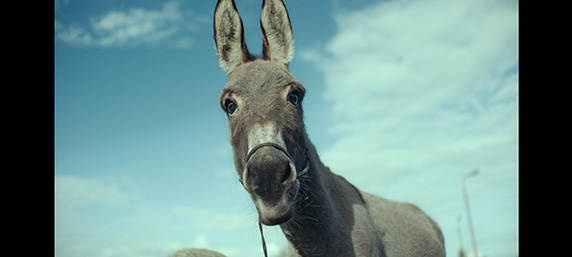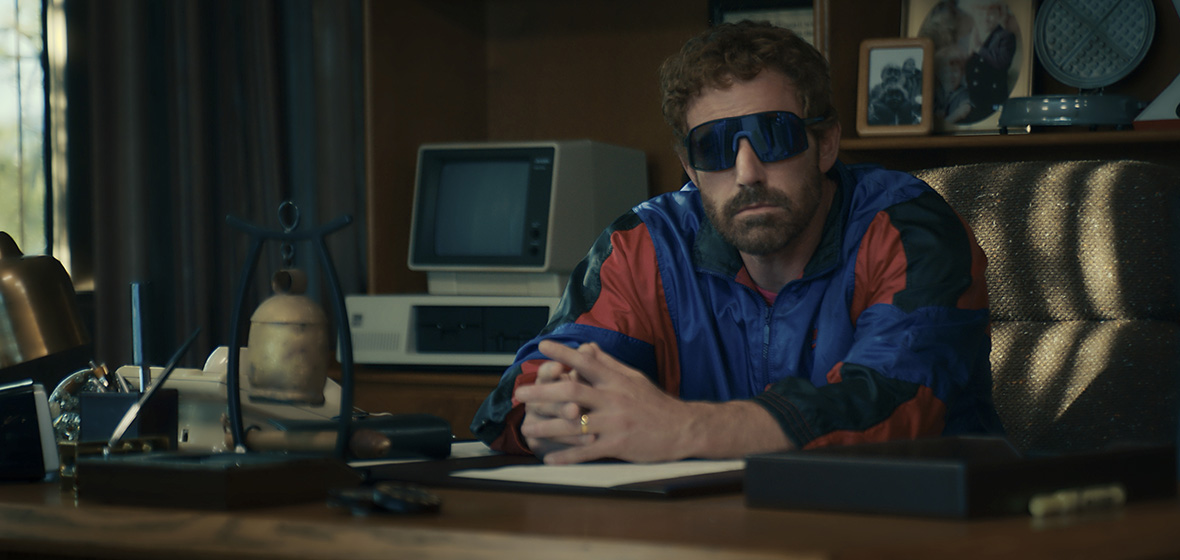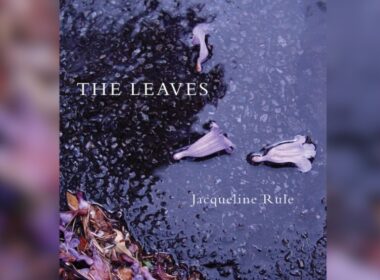Air
Boots Ridley, the socialist provocateur filmmaker behind the satirical masterpiece Sorry to bother you, commented on social media earlier in the month that Hollywood’s trend of producing films where corporate capitalism is the hero comes as a direct reaction to the unhappiness of the working class. It’s a reminder that the brand, the corporate overlord, is part of our fabric. The workers, disposable as they are, would be so happy to be part of this culture-defining company.
Air is the true story of how a corporation once made a deal with a sportsperson and then made a bazillion dollars. It starts with a montage of American pop culture in the ’80s. American pop culture is, of course, brands, so the montage includes ads, franchises, toys, and consumable products. The music is ’80s bubblegum pop rock, radio-friendly air-metal, classics to some, but, let’s be honest, products from corporate shills. Culture isn’t transgressive in this world, and this world isn’t ours. Culture is quantified by its value. In the end credits, Air has the usual subtitles that reveal what happened to every character, only this time the only thing it has to say is how much money everyone earned since the events of the film. That is the priority.
The brand is Nike, and the event is how they signed a young Michael Jordan against all odds. You see, Nike wasn’t the powerhouse we know today, and every basketball player with any self-worth would instead sport Adidas or Converse shoes. But this didn’t stop Sonny Vaccaro (Matt Damon), who managed to convince his marketing manager Rob Strasser (Jason Bateman), Nike founder and CEO Phil Knight (Ben Affleck) and, more importantly, Jordan’s mother Deloris (Viola Davis), to sign the future superstar. The film tells of the events that led to the meeting between the brand and the player. It’s literally 90 minutes of presentation prepping and then the meeting itself. All accompanied by a mixtape of ’80s hits so clichéd it could be mistaken for a “Now that’s what we call music!” compilation.
The style is very Aaron Sorkin-lite, which is a shtick increasingly easy to imitate. While that isn’t necessarily bad, it doesn’t hide the film’s annoying adulation of mindless capitalism. But it also makes thid a very entertaining story. It’s not bad, and mostly because writer Alex Convey lands the structure perfectly. The film wears its Reagan-era-shining-city-on-the-hill philosophy on its sleeve. It believes in the world it’s trying to sell. Maybe even tell us things were better during the glorious years of gung-ho capitalism. But it’s all so slick and cool. It’s hard not to be charmed.
Convey paces the script like a classic Sorkin – everyone (every man) is funny and quick, and no one thinks about their answer because everyone has the right answer ready to go. The closest thing to an antagonist is Jordan’s agent, played by Chris Messina, in the manner of someone who idolises Gordon Gecko, is so captivating you excuse his own jingoistic “I don’t have friends, I have clients”.
The problem is the intention behind Air. The film had the blessing of Nike and is co-produced by Amazon Studios – whose own CEO wants to be as cool as Knight is and is facing backlash for the way he treats his workers. Not that Knight comes out unscathed – the film isn’t as patronising as The Founder was – and Convey and Affleck, who also directed it, aren’t as sympathetic to him, instead making him a new-age doofus whose success may have come from surrounding himself with the best people. But at the end, during those subtitles mentioned above, Knight’s only mention is about how much money he gave to charity (funny, though, nothing about the billions of dollars of tax he dodged).
It’s all clean-cut and white-washed, despite the film trying to set itself apart. The driving force behind this is the working men. Vaccaro for the foresight, Peter Moore (Matthew Maher) for the design, and Jordan for the talent, but the world they live in is one of ruthless exploitation, and the film never bothers to address that.
The sport sadly plays second fiddle in the ensemble, which is interesting, given the best moments of the film are when Vaccaro muses about the poetry of the game. In one scene, he analyses Jordan during a specific play, the camera freezing on the young player as if asking us to fall in love with him. It’s an emotional moment, but compare it to the scene in Ken Loach’s Looking for Eric when soccer player Eric Cantona describes his favourite play in the game. The point in Eric is to elevate the sport to an almost romantic status. The point of the scene in Air is to help Vaccaro make a million dollars.
This financial objective is encapsulated in the scene where Strasser talks about how he used to listen to Bruce Springsteen’s “Born in the USA” to pump himself up before going to work every morning, until one day he listened to the lyrics and realised the song’s message is about Vietnam veterans returning and finding only pain and misery back at home. The film spells out the conundrum of America – no one pays attention to the message because we are so distracted by the music. And yet those end titles, when we learn how much money everyone made, is played precisely to the tune of “Born in the USA”. I want to give the filmmakers the benefit of the doubt: that this was a satirical and self-aware choice. But I suspect their motivation is more cynical than that, and that’s a shame, isn’t it?
Verdict: 2 out of 5
For Reaganites who dream large and still believe in trickle-down economics, and everyone else who can enjoy an entertaining piece without overthinking politics.

EO
Let’s address the giant donkey in the room – Jerzy Skolimowski’s EO is inspired by Robert Bresson’s 1966 masterpiece Au hasard Balthazar, but this is a different film. It’s important to point out this difference because Balthazar is such a sui-generis and influential piece of cinema that any movie about a wandering donkey gets compared to it. While Skolimowski doesn’t hide his inspiration, I appreciate that EO, in the end, is its own piece of cinema and, as a mark of its quality, it can be enjoyed by both those who know and love Bresson’s film and those who haven’t seen it yet.
The setup is very simple. EO is the donkey of a Polish circus performer named Kassandra (Sandra Drzymalska). She loves and cherishes EO like a good person loves and cherishes a pet – as somewhere between a best friend and a child. When animal rights activists protest, EO is taken to a countryside stable. He starts his journey through the multi-layered European continent. From the perspective of an innocent animal, Skolimowski leads the audience to observe a borderless land connected by geographical proximity. EO bumps accidentally into a varied group of people from every possible social status in Europe. Often he turns his camera to the reflection of EO’s eye, as Spielberg did in his War Horse. But, while the American wanted to elevate the animal by ascribing personality, Skolimowski seems to be asking himself if a donkey can understand the misery and the beauty facing him. In a beautiful scene, EO observes a group of wild horses running in the field. Whatever he’s thinking about is the business of everyone in the audience, in the sense that Skolimowski invites us to project ourselves onto EO.
EO sounds too similar to the word “I” in some romantic languages – ‘Eu’ in Portuguese and Romanian, ‘Io’ in Italian. It’s fitting that everything that happens is a conduit for us to observe, rather than Skolimowski analysing the complexities of the continent: Europe contains multitudes and is most enjoyable when we don’t react to its particularities.
It helps that cinematographer Michal Dymek is free to push the boundaries of the images. EO is gorgeous, even without being elevated by Pawel Mykietyn’s hauntingly romantic score; wide-angle lenses and perfectly saturated colours add a dimension rarely seen in modern cinema. And you need that aesthetic because EO is understandably a challenging film for the general audience.
Though it clocks in just shy of 90 minutes, there is little of a story in this film, and barely any dialogue. It’s hanging on how much it works to see a donkey looking at things and moving away before any resolution. It’s as if we’re flicking through channels, but instead of sub-par television, we’re seeing the whole world, the whole of society, in front of us. And if there’s a message to take from the film, it’s that the only way to face this madness that surrounds us is with the innocence of a wandering ass.
Verdict: 4 out of 5
For art-house lovers, Terrence Malick and Michelangelo Frammartino.




